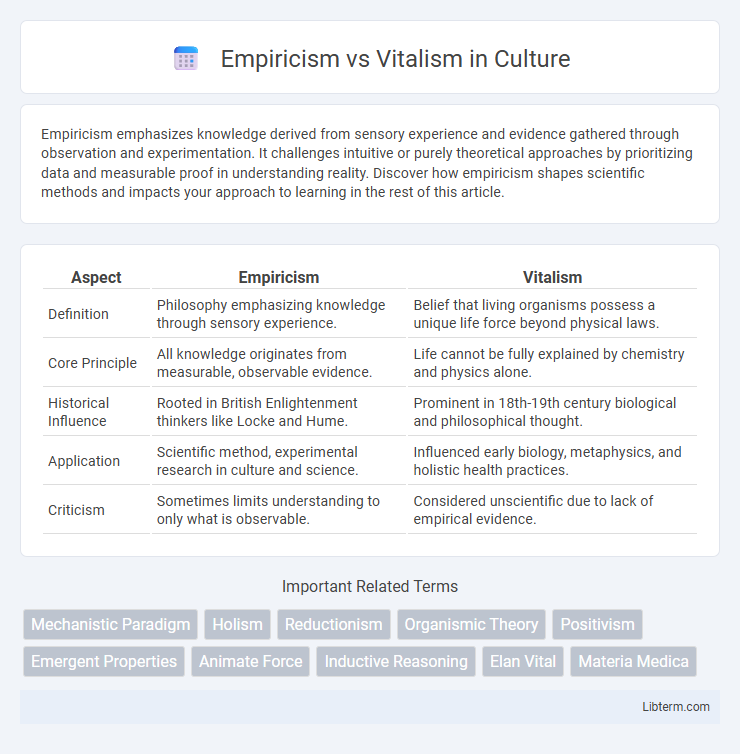Empiricism emphasizes knowledge derived from sensory experience and evidence gathered through observation and experimentation. It challenges intuitive or purely theoretical approaches by prioritizing data and measurable proof in understanding reality. Discover how empiricism shapes scientific methods and impacts your approach to learning in the rest of this article.
Table of Comparison
| Aspect | Empiricism | Vitalism |
|---|---|---|
| Definition | Philosophy emphasizing knowledge through sensory experience. | Belief that living organisms possess a unique life force beyond physical laws. |
| Core Principle | All knowledge originates from measurable, observable evidence. | Life cannot be fully explained by chemistry and physics alone. |
| Historical Influence | Rooted in British Enlightenment thinkers like Locke and Hume. | Prominent in 18th-19th century biological and philosophical thought. |
| Application | Scientific method, experimental research in culture and science. | Influenced early biology, metaphysics, and holistic health practices. |
| Criticism | Sometimes limits understanding to only what is observable. | Considered unscientific due to lack of empirical evidence. |
Introduction to Empiricism and Vitalism
Empiricism emphasizes knowledge derived from sensory experience and observation, forming the foundation of scientific inquiry through evidence-based methods. Vitalism posits that living organisms are governed by a unique life force or vital principle beyond physical and chemical processes. Both perspectives significantly shaped early modern philosophy and the development of biological sciences.
Defining Empiricism: Core Principles
Empiricism is a philosophical doctrine emphasizing that knowledge arises primarily from sensory experience and evidence gathered through observation and experimentation. Central principles include the rejection of innate ideas and the assertion that the human mind starts as a blank slate (tabula rasa). Empiricism underpins scientific methods by prioritizing empirical data and inductive reasoning to build knowledge about the natural world.
Understanding Vitalism: Key Concepts
Vitalism asserts that living organisms possess a unique life force or vital principle that cannot be explained solely by physical or chemical processes, distinguishing vital phenomena from mechanical ones. Key concepts include the idea of an immaterial life energy that governs biological functions and cannot be reduced to empirical observation or experimentation. This perspective contrasts sharply with empiricism, which relies on sensory experience and scientific methods to understand life and rejects non-material explanations.
Historical Origins and Evolution
Empiricism originated in the early modern period with philosophers like John Locke and David Hume emphasizing sensory experience as the foundation of knowledge, shaping scientific methodology. Vitalism emerged in the 18th and 19th centuries as a biological doctrine asserting that living organisms possess a vital force distinct from physical and chemical processes, influenced by thinkers such as Georg Ernst Stahl and Hans Driesch. Over time, empiricism evolved to underpin evidence-based science, while vitalism declined with advancements in biochemistry and molecular biology demonstrating life processes through physical laws.
Empiricism in Scientific Practice
Empiricism in scientific practice emphasizes observation and experimentation as the primary sources of knowledge, grounding theories in measurable evidence and repeatable results. This approach fosters the development of hypotheses that are tested through controlled experiments, ensuring objectivity and reliability in scientific conclusions. By relying on sensory experience and empirical data, empiricism drives the iterative refinement of scientific models and advances understanding across disciplines.
Vitalism in Medical and Philosophical Traditions
Vitalism, rooted in medical and philosophical traditions, posits that living organisms possess a unique vital force distinct from physical and chemical processes, influencing health and disease beyond empirical measurement. This concept shaped early medical theories by emphasizing the body's intrinsic energy or spirit as essential to vital functions and healing. Despite challenges from empiricism and advancements in biochemistry, vitalism remains influential in holistic and alternative medicine, highlighting the non-reducible nature of life processes.
Major Debates: Evidence Versus Essence
Empiricism emphasizes knowledge derived from sensory experience and observable evidence, prioritizing measurable phenomena in scientific inquiry. Vitalism argues for an inherent life force or essence that cannot be fully explained by physical or chemical processes alone. The major debate centers on whether empirical evidence suffices to explain biological phenomena or if an immaterial essence is necessary for understanding life.
Key Thinkers and Influential Works
John Locke and David Hume are prominent empiricists who emphasized sensory experience as the foundation of knowledge, with Locke's "An Essay Concerning Human Understanding" and Hume's "A Treatise of Human Nature" shaping empiricism's core principles. In contrast, vitalists like Hans Driesch and Henri Bergson argued that life cannot be explained solely by physical and chemical processes, articulated in Driesch's "The Science and Philosophy of the Organism" and Bergson's "Creative Evolution." These key thinkers and their influential works highlight the fundamental debate between empiricism's reliance on observable evidence and vitalism's assertion of a life force beyond mechanistic science.
Contemporary Relevance and Applications
Empiricism's emphasis on observation and evidence underpins modern scientific research, influencing fields such as psychology, medicine, and artificial intelligence by promoting data-driven methodologies. Vitalism's concept of a life force, though largely rejected in biological sciences, persists in complementary and alternative medicine practices like homeopathy and holistic healing, reflecting enduring cultural and philosophical perspectives. The contemporary relevance of both philosophies shapes ongoing debates about the nature of life, consciousness, and the limits of scientific explanation.
Conclusion: Synthesizing Perspectives
Empiricism emphasizes knowledge derived from sensory experience and observable evidence, while Vitalism posits a unique life force beyond physical and chemical processes. Synthesizing these perspectives reveals that scientific inquiry benefits from empirical methods while acknowledging the complexity of living systems that may exhibit emergent properties not fully explained by reductionist approaches. Integrating empirical data with holistic understanding fosters a more comprehensive view of biological phenomena.
Empiricism Infographic

 libterm.com
libterm.com